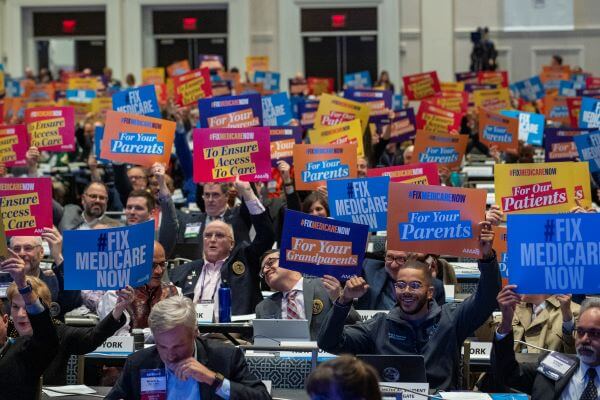
Texas medicine made its voice heard on a wide variety of national issues at the 2023 Interim Meeting of the American Medical Association (AMA) House of Delegates in Washington D.C., achieving success in four priority areas: supporting Medicare payment reform, opposing a single-payer system, securing tighter restrictions on nonphysician practitioners, and preventing the use of virtual credit cards.
“It’s a lot of work but very worthwhile,” said David Henkes, MD, chair of the Texas Delegation to the AMA. “We spent a lot of time getting ready for our reference committees and even more time debating policy to improve our profession and our ability to take care of our patients.”
More than 70 Texas physicians from across the state descended upon the U.S. Capitol to effect change in federal health care policy. Here are the highlights:
Reform Medicare: In June, Texas carried a unanimously approved resolution at the AMA Annual Conference that called for a full-court advocacy and communications press by AMA to reform Medicare’s flawed payment system, and to make Medicare reform AMA’s number one priority. Texas continued its pressure in November with another resolution urging AMA to stop the 3.4% Medicare pay cut, prioritize Medicare payment reform to ensure physician practice viability, achieve annual Medicare payment increases, and to initiate a media relations campaign to educate the public. The AMA House of Delegates again unanimously passed the measure.
Maintain a pluralistic payment system: Texas stood firm in halting a resolution that aimed to change AMA policy by removing its opposition to a single-payer system. TMA President-Elect Ray Callas, MD, weighed in on behalf of the Texas Delegation with a strong “no.” “A single-payer system is the single way to crater the practice of medicine and the standard of care our patients deserve,” he testified to reference committee members. After much debate, the resolution was defeated.
Prevent virtual credit card (VCC) payments: With Texas’ backing, the AMA house approved a measure calling on AMA to advocate and clearly state that is not advisable or beneficial for medical practices to get paid by VCCs, and to stop the growing and excessive electronic funds transfer (EFT) add-on service fees charged by payers. The move comes as federal lawmakers in late November introduced a bill to stop EFT fees. (Read TMT for future coverage.)
Stop scope creep: Texas testified in strong support of a house-adopted measure that calls for emergency departments to be staffed by board-certified emergency medicine physicians.
TMA-member highlights at the conference were also many:
- Texas celebrated TMA past presidents Robert Gunby Jr., MD, and William H. Fleming III, MD, who will complete their terms as AMA delegates after 24 and 22 years of dedication, respectively.
- TMA Board Trustee Jayesh Shah, MD, earned the AMA Ambassador Award.
- Anand Singh, a third-year medical student at The Anne Burnett Marion School of Medicine at Texas Christian University, won the position of chair-elect of the AMA Medical Student Section (MSS).
- Victoria Gordon, DO, was elected as a delegate to the AMA Resident & Fellow Section.
- Three medical students earned MSS delegate roles: Radika Patel (Region 3 delegate), Hari Sainath, and Kimberly Ibarra (Region 3 alternate delegates).
Last Updated On
November 30, 2023
Originally Published On
November 30, 2023